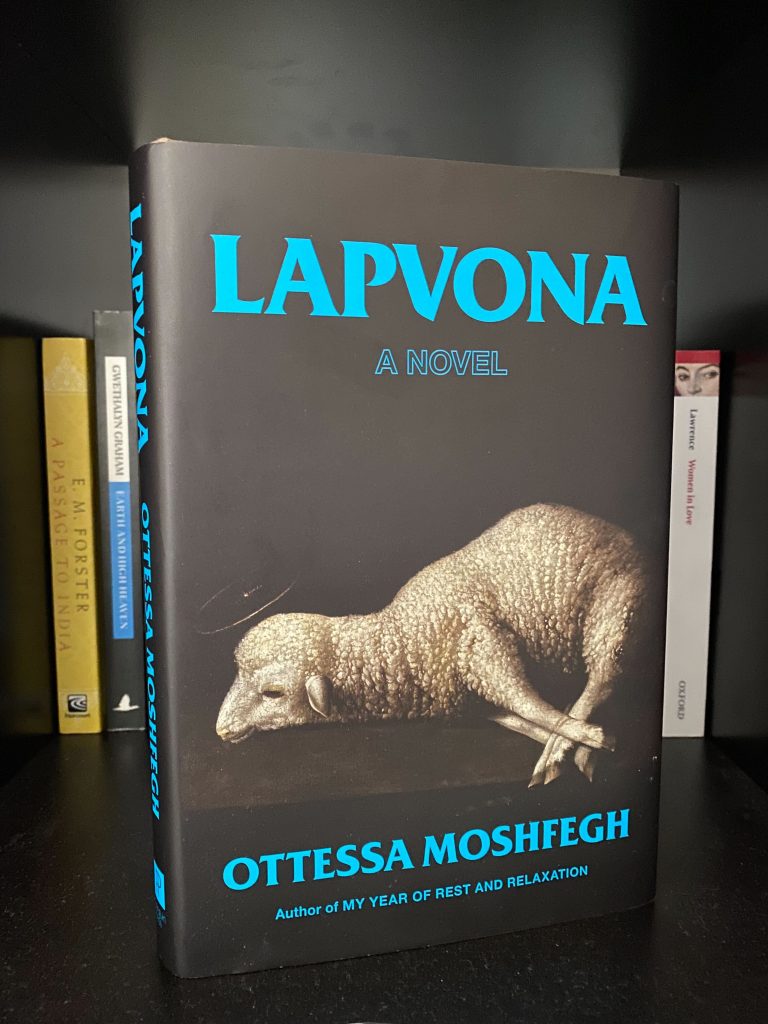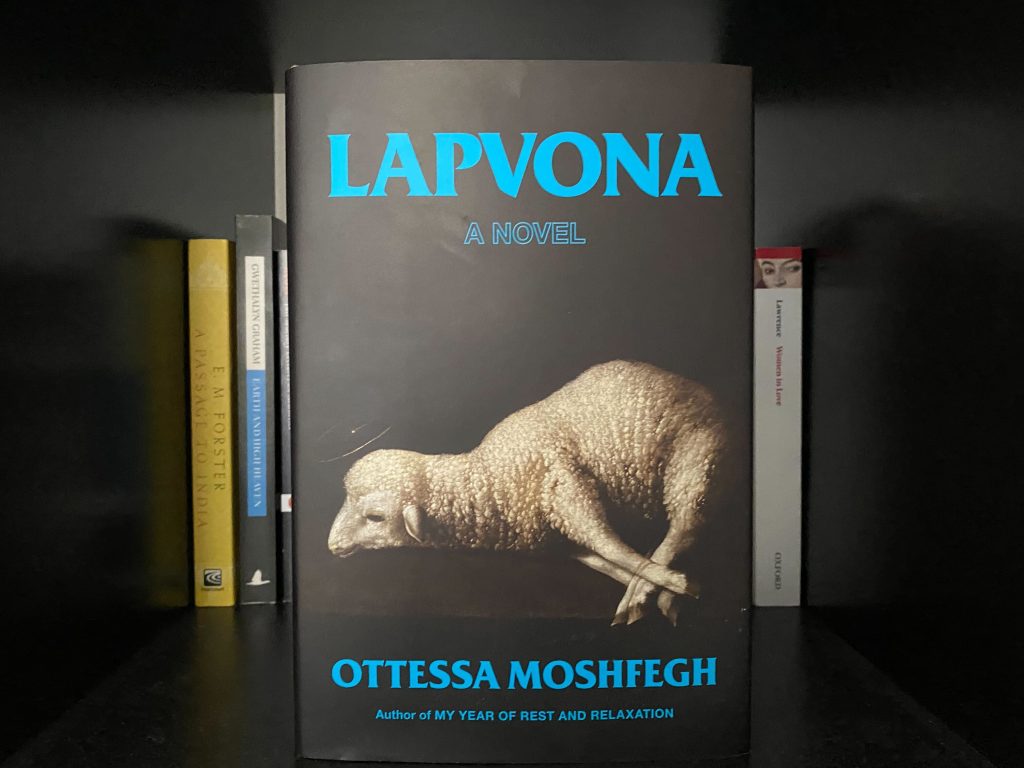Lapvona, Ottessa Moshfegh’s new novel, is not for the faint of heart; Moshfegh matter-of-factly injects stomach-turning details into her plot, which follows Malek, a boy born with birth defects, as he survives in the faintly medieval, faintly fairy-tale-esque village of Lapvona. After accidentally killing Jacob (although Moshfegh makes this rather unclear—was it really an accident?), the son of Lapvona’s feudal lord, Malek is traded by his father to go live in this same lord’s manor (a confusing take on a life for a life that indicates how little Malek’s father likes him). What unfortunately ensues is a universal blanket of misfortune, with no character spared. This is no romantic story; nearly every episode in Lapvona is marked by an event of traumatizing proportions. Starvation, cannibalism, accidental and/or intentional homicide, a woman who replaces her eyes with those of a horse—these are only a handful of moments that characterize this story as one filled with suffering.
This is something that many other reviewers remark on as well. In her review of Lapvona, Becca Rothfeld of The Guardian observes that the novel “trades less in human drama than in seething shocks, quick to titillate and quick to expire.” Reading review after review on the subject, I quickly came to the realization that Lapvona has captivated its audience for a variety of reasons, but mainly for the gruesome shocks that are scattered innocuously and brutally throughout the tale. Moshfegh is known for her particularly unlikeable characters, but does that mean that Lapvona is yet another Moshfegh churn-out, a trademarked style that the author knows she can employ to garner a suitable amount of applause, disapproval, and gagging? Browsing through reviews, it seemed like most had drawn this conclusion: Moshfegh writes good suffering, and we love and hate her for it at the same time.

Is it naive, then, to wonder if there might be some deeper significance infused in our talented author’s terrible descriptions of Lapvonian life? Even the magical elements of the novel are sad and sparse; Ina, an ancient witch-doctor type character, dispenses herbal remedies to the villagers of Lapvona which seem, in their eyes, to be magically successful. More often than not, however, the cures are merely natural, although some unwitting urine-drinking on the villagers’ part is also involved. Similarly, Ina’s other abilities are also compromised, like when her ability to speak with and listen to the birds of the forest disappears after she consumes human flesh, or how she gauges out the eyes of a horse to cure her blindness, leaving her real eyes to shrivel and rot in her home. For all the wonder of Ina’s abilities, they occur in the face of debilitating suffering and provide paltry recompense for the evils of the surrounding world. Even the magical talking birds, which both Ina and Malek can understand, turn sour as things in Lapvona go awry; they sing of tragedies and eventually go silent. Magic cannot win here. In some ways, Moshfegh has adapted magical realism and forced it to kneel in front of the misery of life; rather than offering escape, the magic of Lapvona suggests that freedom from suffering is an illusion, even in a world that makes the impossible possible.
Other characters, too, live painfully outside of the realm of the fantastic. The town of Lapvona is medieval in the harshest and poorest sense of the word, and the tragic events that befall the villagers—like bandits continually ransacking their village (at their feudal lord’s behest) or a drought that forces them to cannibalize one another (while the same feudal lord frolics healthily in his manor)—are decidedly excluded from the frail magic that inhabits this world.
What is most magical, and only in a Grimms’ Fairy Tales kind of way, is the unpredictable series of events that pushes the plot along as it follows Malek and a few other villagers such as Malek’s father, Jude, and the aged villager Grigor. When Malek accidentally (or perhaps purposefully, though this is unclear) kills Jacob, the series of events that are set off are calculatedly whimsical, pulling characters in a million different painful twists of fate that inevitably end badly. Magic surely does not exist when she describes Jacob’s body in painful, gruesome detail, even observing the way that the boy’s eyeball pops out of its socket and swings from his broken body.
Andrea Long Chu of Vulture concludes that “This is the premise of Moshfegh’s fiction: Disgust does not preclude delight—and, in fact, it often enhances it.” It would be a disservice to the novel, and to Moshfegh herself, to conclude that Lapvona is nothing but a tour of the disgusting depths of human nature, even though sometimes it feels like just that. I find it refreshing that we can find few lessons in the irredeemable characters of Lapvona; it’s easier to revel in the disgust of Jude eating another man’s pinky toe when you don’t need to redeem him, or ask yourself why he might have done that, because it’s easy to figure out: he was hungry, and life in Lapvona is hard.
These short, brutal scenes, like Jude’s cannibalism, Jacob’s death, a nun’s rape, or Villiam’s abuse of his servants, are intriguing for their intense, horrifying descriptions, but also because they are distinctly understandable. For all the world’s ponderance upon the meaning and capacities of human nature, sometimes peoples’ actions are beyond that. The world is harsh and the people inside it are villains, or victims, or both, and neither God (whom the Lapvonian villagers seek desperately, always), nor circumstance, nor any characters’ self-understanding can change that. Lapvona is an awful place but Moshfegh makes it that way. Though her technical skill is assured, it is clear to me that she writes for a purpose beyond shocking her readers in clean, detached prose. I find it refreshing to accept one character’s awfulness as just that; like in Lapvona itself, there is little sympathy to pass around. Detached from the sentimentality that might usually bias me toward one character or another in a novel, Lapvona provides a freeing experience—cathartic in a sense—of hating, shaming, and rejoicing in the misfortunes of other characters, stooping to their level because, well, why not?

